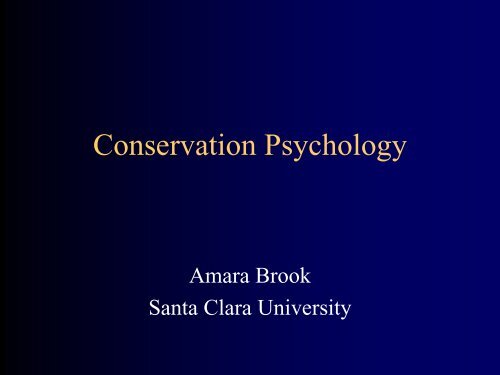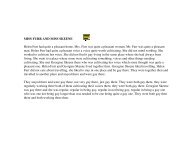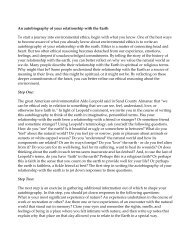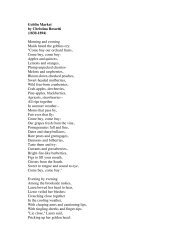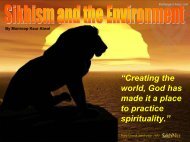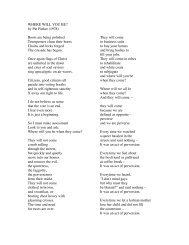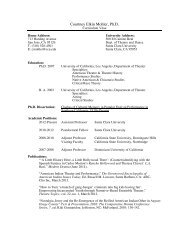Identity and Environmental Behavior - Webpages at SCU - Santa ...
Identity and Environmental Behavior - Webpages at SCU - Santa ...
Identity and Environmental Behavior - Webpages at SCU - Santa ...
You also want an ePaper? Increase the reach of your titles
YUMPU automatically turns print PDFs into web optimized ePapers that Google loves.
Conserv<strong>at</strong>ion Psychology<br />
Amara Brook<br />
<strong>Santa</strong> Clara University
Why do People do wh<strong>at</strong> they do<br />
• If you give people a reward for doing<br />
something they already enjoy doing, they<br />
will subsequently like th<strong>at</strong> activity<br />
– (a) more, (b) the same, or (c) less.<br />
• Is scaring people an effective way to inspire<br />
them to change their behavior
Wh<strong>at</strong> is Psychology<br />
• Scientific study of human thoughts,<br />
feelings, <strong>and</strong> behavior<br />
• Psychologists test theories about why<br />
people do wh<strong>at</strong> they do with d<strong>at</strong>a<br />
• Not all clinical!
Why not just analyze anecdotes or<br />
rely on personal experiences<br />
• Not necessarily represent<strong>at</strong>ive<br />
• Imagine trying to make conserv<strong>at</strong>ion plans<br />
without any biological knowledge - ability<br />
to anticip<strong>at</strong>e wh<strong>at</strong> will happen is better with<br />
theoretical perspective
Analyzing the Trainwreck<br />
• Ignored likely Texan resistance to plan perceived as<br />
coming from an environmental group <strong>and</strong> liberal California<br />
– A social identity perspective might have anticip<strong>at</strong>ed this.<br />
• Ignored power of l<strong>and</strong>owners’ desire to maintain<br />
management freedom (<strong>and</strong> overestim<strong>at</strong>ed their fix<strong>at</strong>ion on<br />
economic maximiz<strong>at</strong>ion)<br />
– Reactance theory would predict this.<br />
• Expected everyone to evalu<strong>at</strong>e the plan based on its logical<br />
merits, not peripheral things like who’s tried it before<br />
– Persuasion perspective - People are often not thinking so make<br />
sure the peripheral cues align with the strong arguments.
How can we promote<br />
sustainable behavior<br />
• Old approach: Legal “comm<strong>and</strong> <strong>and</strong><br />
control”<br />
• 90s: Economic incentives<br />
• 2000-future: Multi-disciplinary str<strong>at</strong>egies
Wh<strong>at</strong> is Conserv<strong>at</strong>ion Psychology<br />
• Psychological research th<strong>at</strong> seeks to<br />
underst<strong>and</strong>:<br />
– Why people hurt the n<strong>at</strong>ural environment<br />
– Why people help the n<strong>at</strong>ural environment<br />
– How to promote sustainable behavior<br />
(Clayton & Brook, 2005; Saunders, 2003)
Conserv<strong>at</strong>ion Psychologists study…<br />
• How emotions, thoughts, values,<br />
motiv<strong>at</strong>ions, social settings, culture, etc.<br />
affect conserv<strong>at</strong>ion-relevant behavior<br />
• How to intervene to promote sustainable<br />
behavior
Some CP Questions<br />
• Does the Endangered Species Act encourage<br />
priv<strong>at</strong>e l<strong>and</strong>owners to help species<br />
• Does the Ecological Footprint questionnaire<br />
promote sustainable behavior<br />
• How can advertisements best promote sustainable<br />
behavior
Social Psychological View<br />
• Social Psychology is “the scientific study of<br />
how people think about, influence, <strong>and</strong><br />
rel<strong>at</strong>e to one another” (Myers, 2005)<br />
•Examples:<br />
– Social norms<br />
– Intergroup conflict<br />
– <strong>Identity</strong>
A Social Psychological Model of<br />
Context<br />
x<br />
Conserv<strong>at</strong>ion <strong>Behavior</strong><br />
(Clayton & Brook, 2005)<br />
Schemas<br />
<strong>Behavior</strong><br />
x<br />
Motives
Context<br />
• “In the beginning, don’t look inside the<br />
person. Instead, look outside…” (Markus,<br />
2004, p.2)<br />
• Social environment<br />
– Inform<strong>at</strong>ional influence (Cialdini, Reno, &<br />
Kallgren, 1990)<br />
– Norm<strong>at</strong>ive influence (Reno, Cialdini, &<br />
Kallgren, 1993)<br />
• Physical environment
Schemas<br />
• Differences in past experience result in<br />
different stored knowledge, or schemas<br />
• Schemas affect interpret<strong>at</strong>ions of<br />
environmentally relevant contexts
Motives<br />
• People have various fundamental motives<br />
such as self-esteem, affili<strong>at</strong>ion <strong>and</strong> control<br />
• Motives affect how contexts are interpreted<br />
<strong>and</strong> how people behave
The Self: A Powerful<br />
Motiv<strong>at</strong>ional System<br />
• <strong>Identity</strong>: a person’s perception of his or her self<br />
(James, 1890)<br />
– Reduces social uncertainty<br />
– Can enhance self-esteem<br />
• Contingency of self-worth: an area of life on<br />
which a person perceives his or her self-esteem<br />
depends (Crocker & Wolfe, 2001)
Additional Resources<br />
• Conserv<strong>at</strong>ion Psychology website:<br />
http://www.conserv<strong>at</strong>ionpsychology.org<br />
• Conserv<strong>at</strong>ion Psychology email listserv: to join, email<br />
<strong>at</strong>brook@scu.edu<br />
• Clayton, S. & Brook, A. (2005). Can psychology help save<br />
the world A model for conserv<strong>at</strong>ion psychology. Analyses<br />
of Social Issues <strong>and</strong> Public Policy, 5(1), 1-15.<br />
• Saunders, C. (2003). The emerging field of conserv<strong>at</strong>ion<br />
psychology. Human Ecology Review, 10, 137–153.


